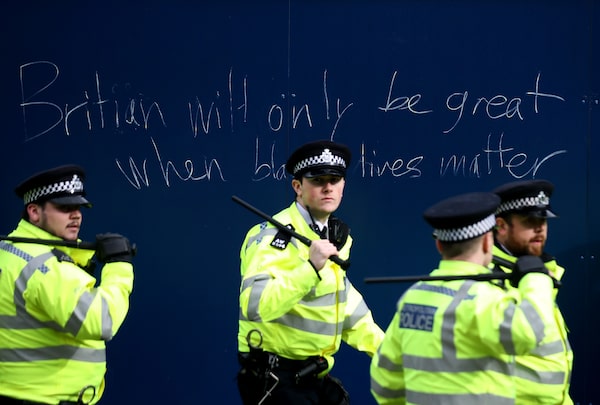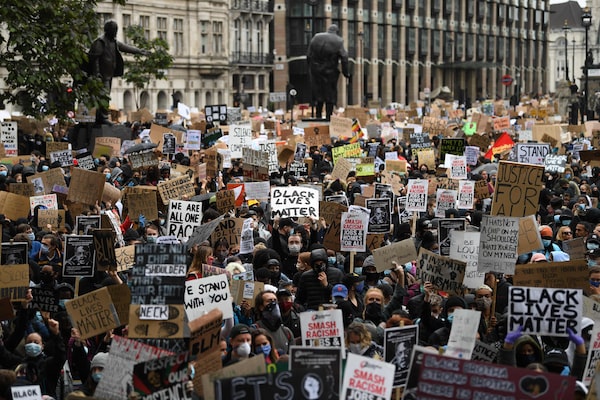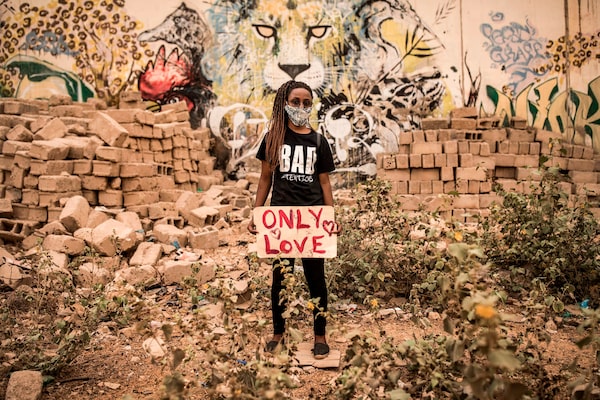Police officers stand guard in front of demonstrators holding banners during a protest against police brutality and racial inequality in the aftermath of the death in Minneapolis police custody of George Floyd, in Berlin, Germany June 6, 2020.FABRIZIO BENSCH/Reuters
Germany
In Berlin, where police said 15,000 people rallied on the German capital’s Alexander Square, protesters chanted Floyd’s name and held up placards with slogans such as “Stop police brutality” and “I can’t breath.”
Floyd, a Black man, died after a Minneapolis police officer pressed a knee on his neck even after he pleaded for air while handcuffed and stopped moving.
“The killing and these violent physical things that have happened is only just the top of it,” said Lloyd Lawson, 54, who took part in the Berlin protest. “That’s why you’ve got to start right from the bottom, just like an iceberg.”
A video from Berlin, also shared on social media, showed several police with dogs arresting a Black man scuffling with an officer. Anja Dierschke, a spokeswoman for Berlin police, said the incident happened some time after the protest ended and officers had ordered a group of people, some of whom were throwing bottles at passers-by, to disperse.
Some 20,000 people rallied in Munich, while thousands more took part in protests in Frankfurt and Cologne.

Anti-racism demonstrators take a knee in front of Toronto CIty Hall during a march on Saturday, June 6, 2020.Frank Gunn/The Canadian Press
Canada
Hundreds of anti-racism demonstrators took their message to Toronto’s city hall and Ontario’s legislature in a pair of protests Saturday, taking a knee in silence at points, amid events across Canada protesting violence against Black people.
At one of two peaceful demonstrations in Toronto, cars honked in support as they passed the people kneeling outside of the Superior courthouse and the U.S. consulate, which are across the street from each other. They also kneeled outside of Toronto Police headquarters.
Events were also planned in several other Ontario cities including Guelph, London and Niagara Falls, where the Whirlpool Bridge to the United States was closed Saturday to all but essential traffic so demonstrators could protest.
In St. John’s, N.L., VOCM radio reported that a crowd of several thousand people gathered for a Black Lives Matter Rally at Confederation Building during the afternoon.
Meanwhile, organizers of a Montreal event scheduled for Sunday told police today they were rescinding an invitation to police chief Sylvain Caron to attend after some groups opposed his presence.
Read the full story on Canada’s protests here

People raise their fists in front of riot policemen during a protest at the Champ de Mars, with the eEiffel Tower in background in Paris on June 6, 2020, as part of "Black Lives Matter" worldwide protests against racism and police brutality.GEOFFROY VAN DER HASSELT/AFP/Getty Images
France
In Paris, several thousand demonstrators ignored a protest ban — issued due to the coronavirus pandemic — and assembled within sight of the U.S. Embassy, kept back by imposing barriers and riot police.
Among the crowd in the French capital was Marie Djedje, 14, a Parisian born on July 14, the French national day.
“I was born French, on the day when we celebrate our country. But on a daily basis, I don’t feel that this country accepts me,” she said, holding up a sign that read “Being Black is not a crime.”
The teenager said that emerging from France’s virus lockdown and seeing officers on patrol again drove home how scared she is of the police and how she has steeled herself for a life of overcoming obstacles.
“I know that because of my skin colour I’m starting out with a handicap, for example, if I want to get a flat or go to a top school,” she said. “I know I’m going to have to fight twice as hard as the others. But I’m prepared.”
Adele Letamba, a 39-year-old consultant protesting in Paris, put it bluntly: “The death of George Floyd was the spark that spread across the world.”

Police officers walk in-front of graffiti during a Black Lives Matter protest on June 06, 2020 in London, United Kingdom.Alex Pantling/Getty Images
Britain
In central London, tens of thousands staged a rally outside Parliament Square, invoking Floyd’s memory as well as people who died during police encounters or indifference in Britain. Some protesters ignored thickening rain clouds and later headed toward the U.K. Home Office, which oversees law enforcement and immigration, and to the U.S. Embassy.
Many dropped to one knee and raised their fists in the air outside the gleaming embassy building south of the River Thames. There were chants of “Silence is violence” and “Color is not a crime.”
The majority of those marching wore masks and other face coverings, and appeared to make an effort to adhere to social distancing guidelines by walking in small groups.
An estimated 15,000 people gathered in the heart of Manchester, England, while 2,000 people joined in a demonstration in the Welsh capital of Cardiff.
Andrew Francis, 37, a Black man from London, said there’s “a lot of frustration due to racial discrimination, and we want change for our children and our children’s children’s to be able to have equality within the U.K, the U.S., all around the world.” Francis, who wore a face covering, said he wasn’t worried about the coronavirus and said the fight for racial equality was “more important” to him.
In London, police and protesters clashed at the end of a rally near the offices of Prime Minister Boris Johnson. Objects were thrown at police wearing protective gear and video shared on social media appeared to show a horse bolting amid the clashes, unseating a police officer as he hit traffic lights.

Protesters hold placards as they attend a demonstration in Parliament Square in central London on June 6, 2020, to show solidarity with the Black Lives Matter movement in the wake of the killing of George Floyd.DANIEL LEAL-OLIVAS/AFP/Getty Images
Australia
Floyd’s death has also struck a chord with minorities protesting discrimination elsewhere, including demonstrators in Sydney and Brisbane who highlighted indigenous Australians who died in custody.
Indigenous Australians make up 2% of the the country’s adult population, but 27% of the prison population. They are also the most disadvantaged ethnic minority in Australia and have higher-than-average rates of infant mortality and poor health, as well as shorter life expectancies and lower levels of education and employment than other Australians.
While the demonstrations were largely peaceful, there was a brief scuffle in Sydney when police removed an apparent counter-protester carrying a sign reading, “White Lives, Black Lives, All Lives Matter.”
People march on the street in solidarity with protests against the death in Minneapolis police custody of George Floyd in Seoul, South Korea June 6, 2020.HEO RAN/Reuters
South Korea
In South Korea’s capital, Seoul, protesters gathered for a second straight day to denounce Floyd’s death. Wearing masks and black shirts, dozens of demonstrators marched through a commercial district amid a police escort, carrying signs such as “George Floyd Rest in Peace” and “Koreans for Black Lives Matter.”

A Senegalese protester poses for a portrait with her "only love" placard as she joins the global "black lives matter" movement in Dakar on June 06, 2020.JOHN WESSELS/AFP/Getty Images
Senegal
In Senegal, people staged a protest in front of the African Renaissance Monument in the capital of Dakar, holding placards with slogans such as “Enough is enough.”
Chris Trabot, who works for Paris City Hall, said George Floyd’s death last week triggered his decision to demonstrate Saturday for the first time in his life.
Born in the French territory of Martinique, Trabot said he first experienced racism as a child when he moved with his family to mainland France and got in frequent fights with white kids who mocked his skin colour. Recently, his 9-year-old daughter has told him of being a target of racism, too, with schoolmates mocking her hair.

A man throws rocks at police in riot gear, during clashes between anarchist protesters and police in the Polanco neighborhood of Mexico City, Friday, June 5, 2020.Rebecca Blackwell/The Associated Press
Mexico
Protesters have been demanding that authorities be held accountable over the death of Giovanni Lopez, who died in police custody in the western state of Jalisco last month.
The circumstances are unclear, but footage on social media shows a young man, identified as Lopez, being detained by police in early May. Bystanders can be heard saying he was arrested for not using a face mask to prevent the spread of the coronavirus.
Protests in Jalisco’s capital, Guadalajara, flared up again, though on a smaller scale. On Thursday, protesters set a police officer on fire and vandalized buildings and police cars.
Dressed in black and with faces covered, protesters marched along one of central Mexico City’s main avenues, setting fire to cars and smashing up the fronts of a number of businesses, including a local branch of U.S. bank Citigroup Inc.

Protesters attend a rally against Israel plans to annex parts of the West Bank, in Tel Aviv, Israel, Saturday, June 6, 2020.Sebastian Scheiner/The Associated Press
Israel
In Tel Aviv, thousands of protesters joined a Jewish-Arab rally against the Israeli government’s plans to annex parts of the occupied West Bank. The protesters wore masks, but social distancing measures were not strictly maintained as some demonstrators formed small groups. Police initially sought to block the rally, but later allowed it to take place.
Protesters in Israel also demonstrated against what they see as excessive violence by Israeli police against Palestinians. One protester held a poster showing George Floyd and Eyad Halak, a Palestinian with autism who was killed last week by Israeli police officers after apparently being mistaken as an attacker.
People wearing masks hold placards during a protest march over the alleged police abuse of a Turkish man, in echoes of a Black Lives Matter protest, following the death of George Floyd who died in police custody in Minneapolis, in Tokyo, Japan June 6, 2020.ISSEI KATO/Reuters
Japan
In Tokyo, marchers protested against what they said was police treatment of a Kurdish man who says he was stopped while driving and shoved to the ground, leaving him with bruises.
Organisers invoked the U.S. protests, saying they were also marching in support of the Black Lives Matter movement.
“I want to show that there’s racism in Japan now,” said 17-year-old high school student Wakaba, who declined to give her family name.
She and her friend, Moe, marching in their school uniforms, held a sign saying: “If you’re not angry, you’re not paying attention”.
“No justice, no peace, no racist police,” the crowd chanted.
Jamaica
Wearing black and braving a blistering sun, Jamaicans gathered on Saturday to lend support to global protests against police abuses sparked by the death of George Floyd in Minneapolis last month.
Several hundred people stood outside the U.S. Embassy in Kingston with signs and t-shirts reading “Black Lives Matter” and “Enough is Enough,” demanding justice for Floyd as well as Jamaicans who have died at the hands of security forces.
In a country where the vast majority of people are of African descent, Jamaicans say racism can take on subtler forms.
Jemila Henry, 23, expressed solidarity with U.S. protesters and wanted to raise awareness of local problems.
“You have persons in Jamaica who don’t believe we experience anything remotely racist, but technically it can be described as colorism,” she said, noting that Jamaicans with lighter skin are perceived as superior to those with darker skin.
Alice Hogarth, 70, who organized a separate protest at Emancipation Park in central Kingston, said racism due to skin color might be less blatant, “but we have classism here.”
Human rights activist Lloyd D’Aguilar, who attended the protest at the U.S. Embassy, was concerned about a lack of action on killings by security forces in Jamaica.
“There are never any follow-up protests,” he said. “The positive is that people are paying attention to the massive protests in the United States - this is where we need to go.”
Thailand
With pandemic restrictions in Bangkok, activists were going online, asking for video and photos of people wearing black, raising their fists and holding signs, and explaining why they “stand united behind Black Lives Matter”.
The Thai protesters plan to gather on the video-meeting platform Zoom on Sunday and observe 8 minutes 46 seconds of silence - the period that George Floyd was filmed pinned under the officer’s knee
With reports from Reuters
Associated Press journalists Rick Rycroft in Sydney, Dennis Passa and John Pye in Brisbane, Kim Tong-hyung in Seoul, South Korea, John Leicester in Paris, Pan Pylas in London, Shlomo Mor in Tel Aviv and Yuri Kageyama in Tokyo contributed to this report.
Reuters Reporting by Lidia Kelly in Melbourne, Josh Smith in Seoul, Elaine Lies and Mari Saito in Tokyo and Orathai Sriring in Bangkok Writing by William Mallard